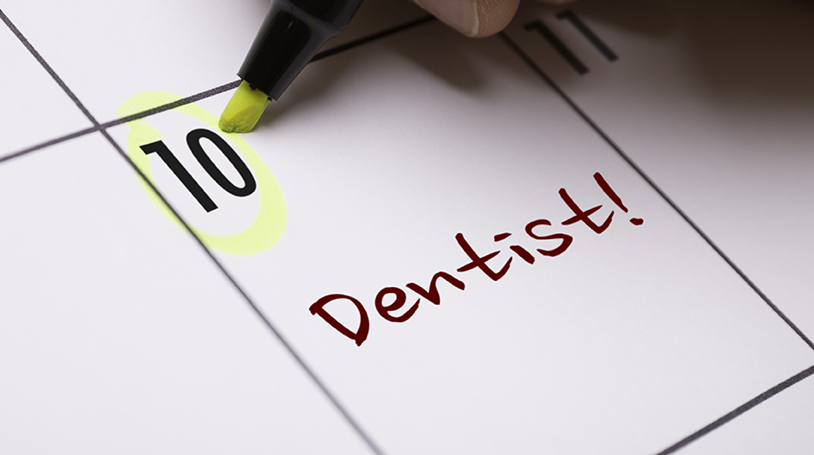

How to visit your dentist less
To be quite frank, the best way to manage your phobia is to get the professional support you need to overcome it. However, it is also important for phobia sufferers to do everything that they can to minimise the need to visit their dentist. Ultimately, of course, you may still need to make an appointment. But, for many phobia sufferers, knowing they are doing everything they can to look after their teeth can give them extra peace of mind. That, in turn, helps reduce anxiety levels before they visit the dentist.
How to cut down on your sugar intake
Cavities and tooth decay are caused by sugars. However, a sugar free diet is not only very difficult to stick to, it is also not entirely nutritious. Everyday foods such as bread, fruit and milk contain different types of sugars which you need to form part of a healthy diet.
However, there are some sugars in our diet that we can live without and most of us know which ones they are. Sticky sweets (such as toffees) and sugar that remains in contact with your teeth for an extended period of time (such as sipping non-diet soft drinks throughout the day) are by far the worst offenders. This doesn’t mean that you have to cut them out completely. What many people do not realise is that it’s not the amount of sugary foods you consume, but the frequency with which you consume them that causes the problem. A steady, sugary assault on your teeth makes them far more prone to decay than the occasional lapse.
It can help to stick to some basic rules. Try and eat sweets such as chocolate bars and drink soft drinks as part of your meals, or eat your daily sweets ration in one sitting if possible. You should also try and avoid keeping sweets in your mouth for long periods of time. If you can, switch to sugar-free boiled sweets. It can also help to chew sugar free gum after meals, because this will neutralize the acids in your mouth which can lead to tooth decay. Rinsing your mouth with water after eating sweets can also help.
How to improve brushing
It is important to brush your teeth at least once every day. Many people who suffer from a phobia can also be obsessive, cleaning their teeth five or six times each day. While that shouldn’t do them too much harm, the fact is that cleaning your teeth very thoroughly once, or ideally twice, every 24 hours is far better than giving them a quick, ineffective brush five times a day.
Do not use a hard brush, as these can cause gum recession and enamel wear – after all, we’re trying to help you avoid visiting the dentist! Dentists recommend using a soft, round-bristled brush. They also recommend replacing your toothbrush at least every 3 months.
Better still, you could invest in an electric toothbrush. While manual toothbrushes can be as effective, most people do a better job with electric toothbrushes. They tend to take more time and to follow the instructions more closely – which all helps them to brush their teeth more effectively. An electric toothbrush also greatly reduces the risk of overbrushing. This should be avoided because it can do damage to your gums.
Can mouthrinses help?

Avoid long-term use of alcohol-based rinses. They may give you fresh breath (for a little while, at least) and reduce build-up of plaque. But they also irritate the mucosa (the membrane in your mouth), and kill the “good” bacteria in the mouth environment. In addition, they dry out your mouth, which leaves your teeth more prone to decay.
If you’re concerned about gum problems, use a rinse containing chlorhexidine gluconate instead of alcohol-containing rinses. Unfortunately, they can only reverse the beginning stages of gum disease (gingivitis), not advanced stages. But they may at least slow the progression of the disease. The disadvantage is that sometimes they can stain teeth.
If you live in a non-flouridated area, you should use a fluoride rinse. However, research has suggested that too much fluoride may be harmful to children so always be sure to follow the manufacturer’s instructions, and the advice of your dentist.
Can flossing help?
Floss is a waxed or unwaxed piece of nylon string inserted between the teeth to remove debris and plaque. While flossing, in principle, is a great idea, it can be difficult. It is helpful to have a dentist to show you how to floss properly. However, if you are trying to avoid visiting the dentist, it’s not always easy to get the help you need.
Many people with a phobia find flossing difficult because they are acutely concerned about damaging their teeth or loosening a filling. If you do loosen a filling through flossing, it is most likely that the filling would have come out of its own accord anyway. However, if you are a dental phobic patient who is trying to minimise trips to the dentist, this is probably small consolation.
As we mentioned above, looking after your teeth is one way to minimise your visits to the dentist and we hope the tips here are helpful. But, ultimately, if you can tackle your phobia then your oral health will benefit far more than through any other action you choose to take. In the first instance, try speaking to your dentist or doctor to get the help you need.

